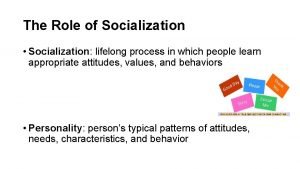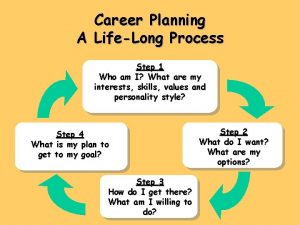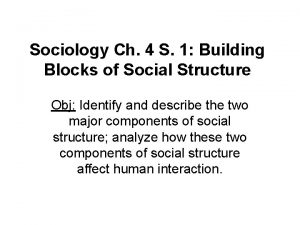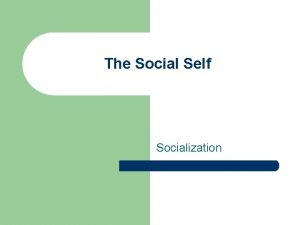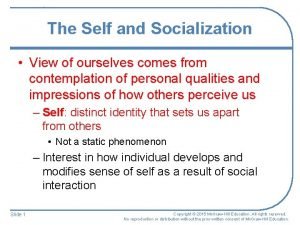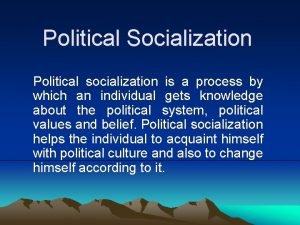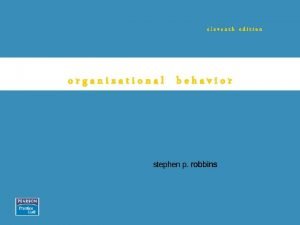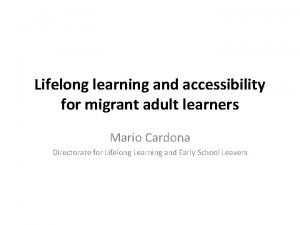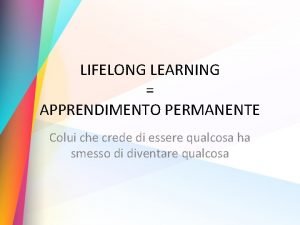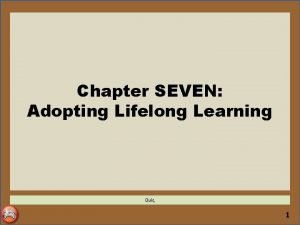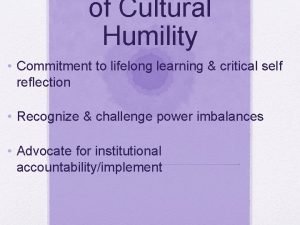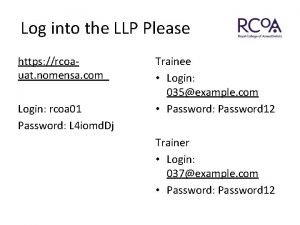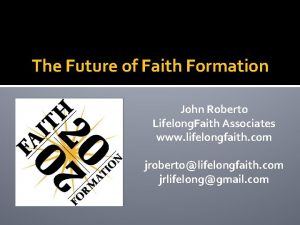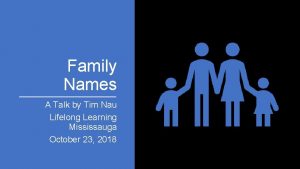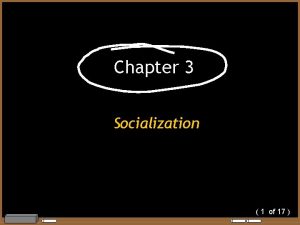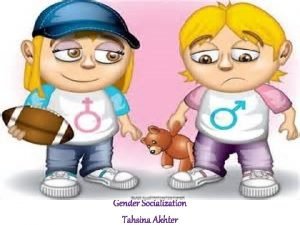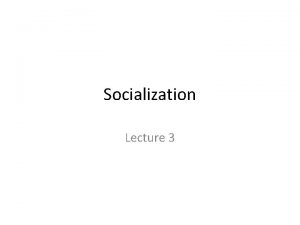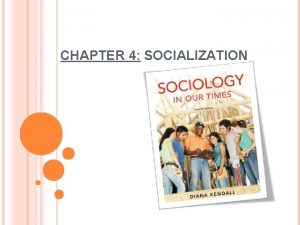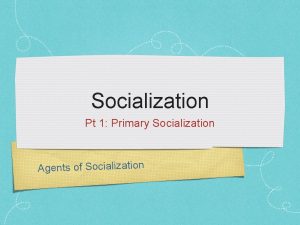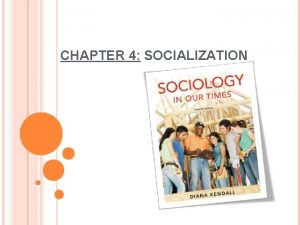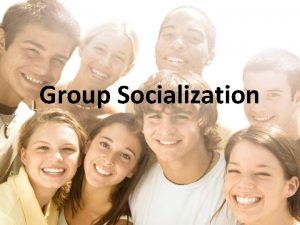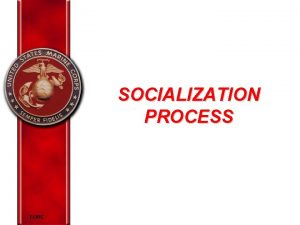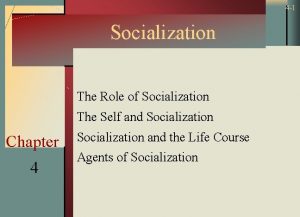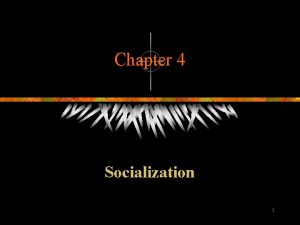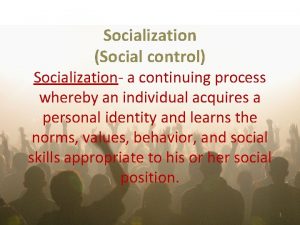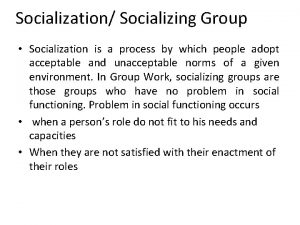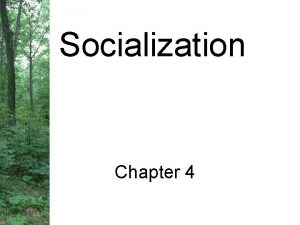The Role of Socialization Socialization lifelong process in







































- Slides: 39

The Role of Socialization • Socialization: lifelong process in which people learn appropriate attitudes, values, and behaviors • Personality: person’s typical patterns of attitudes, needs, characteristics, and behavior

Social Environment: The Impact of Isolation • Interaction of heredity and environment shape human development • Extreme Isolation: Genie

Studies by Harry Harlow (1971) • What happened to monkeys raised away from their mothers? • Fearful and easily agitated • Did not mate • When artificially inseminated, they turned out to be aggressive mothers.

Artificial mothers - need for warmth, comfort, intimacy led to greater social attachment among the infants

Extreme Neglect: Romanian Orphans Primate Studies Social attachments develop from need for warmth, comfort, intimacy

The Influence of Heredity – if twins were raised in totally different social environments, will they have the same IQ?

• Minnesota twin family study (137 sets of identical twins) • Twins have similar intelligence test scores when reared apart in roughly similar social settings • Different scores when reared in different social settings

The Influence of Heredity – does it matter? Genetics Socialization Temperaments Voice patterns Attitudes Values

The Self and Socialization through the Life Course • View of ourselves comes from contemplation of personal qualities and impressions of how others perceive us • Self: distinct identity that sets us apart from others • Not a static phenomenon • Interest in how individual develops and modifies sense of self as a result of social interaction

How do we come to develop self-concept • We are not born with the self concept.

Role of social interaction and socialization • George Herbert Mead – how “self” – a distinct identity is formed?

• We develop and modify the sense of self as a result of social interaction. • This self concept continues to develop and change throughout our life course.

Sociological perspectives on self-development • Charles Cooley- Looking glass self • The looking-glass self is a social psychological concept, created by Charles Horton Cooley in 1902 (Mc. Intyre 2006), stating that a person's self grows out of society's interpersonal interactions and the perceptions of others.

Sociological Approaches to the Self • Cooley: Looking-Glass Self • View of ourselves comes from contemplation of personal qualities and impressions of how others perceive us • Looking-glass self: the self is product of social interactions with other people


Sociological Approaches to the Self • Mead: Stages of the Self • Preparatory stage: children imitate people around them • As they grow older, become more adept at using symbols

Play stage: children develop skill in communicating through symbols, and role taking occurs

Sociological Approaches to the Self • Mead: Stages of the Self (continued) • Game stage: children of about 8 or 9 consider several actual tasks and relationships simultaneously

Generalized other: attitudes, viewpoints, and expectations of society as a whole that a child takes into account in his or her behavior

Generalized other

Table 14 -1: Mead’s Stages of the Self

Sociological Approaches to the Self • Mead: Theory of the Self • Self begins as privileged, central position in a person’s world • As the person matures, the self changes and begins to reflect greater concern about reactions of others • Significant others: individuals most important in the development of the self

Sociological Approaches to the Self • Goffman: Presentation of the Self • Impression management: individual learns to slant presentation of self to create distinctive appearances and satisfy particular audiences (also known as dramaturgical approach) • Face-work: need to maintain proper image of self to continue social interaction

Psychological Approaches to the Self • Freud • Self is a social product • Natural impulsive instincts in constant conflict with societal constraints • Personality influenced by others (especially one’s parents) • Self has components that work in opposition to each other

Kohlberg’s theory of moral development • Deciding what is “good” or “bad” • Learning what is good for the society


Pretty little lady

Table 14 -2: Theoretical Approaches to Development of the Self


Socialization throughout the Life Course Rites of passage: means of dramatizing and validating changes in status • Life course approach: looking closely at social factors that influence people throughout their lives • Terms youth-hood, emerging adulthood, and not quite adult coined to describe the prolonged ambiguous status that young people in their 20 s experience

Anticipatory Socialization and Resocialization • Development of self is lifelong process – 2 types of socialization occur at many points in life. 1. Anticipatory socialization: person “rehearses” future occupations and social relationships. Example – high school students start working part-time 2. Resocialization: discarding former behavior (unlearn) patterns and accepting new ones during transitions in one’s life. Examples – joining military, unemployment

Anticipatory Socialization and Resocialization • Total institution: regulates all aspects of a person’s life under a single authority • Degradation ceremony: ritual in which individual becomes secondary and rather invisible in overbearing social environment

Agents of Socialization • Continuing and lifelong socialization process involves many different social forces • Family • Gender roles: expectations regarding proper behavior, attitudes, and activities of males and females

Agents of Socialization • School • Teaches values and customs of larger society (Functionalism) • Can also reinforce divisive aspects of society (Conflict perspective)

Agents of Socialization • Peer Group • As children grow older, peer groups increasingly assume role of Mead’s significant others • Gender differences are noteworthy among adolescents • What makes you popular?

Table 15 -1: High School Popularity

Agents of Socialization • Mass Media and Technology • Media innovations are important agents of socialization • Role of technology • 12 -17 age group 95% use Internet • Age of use is dropping • Concerns about teen use of Internet; however, use of technology not always negative • New communication technologies in developing countries

Agents of Socialization • Workplace • Learning to behave appropriately within occupational setting is a fundamental aspect of human socialization • US – highest number of teen age children working (developed countries) • Religion and State • Government and organized religion impact life course by reinstituting some rites of passage

 Example of resocialization
Example of resocialization Socialization is a lifelong process through which
Socialization is a lifelong process through which Definition of hidden curriculum
Definition of hidden curriculum It is a lifelong process of social interaction
It is a lifelong process of social interaction Career development is a lifelong process
Career development is a lifelong process Worker role azure
Worker role azure Ambiguitätstoleranz krappmann
Ambiguitätstoleranz krappmann Role conflict occurs when fulfilling the role expectations
Role conflict occurs when fulfilling the role expectations Self socialization definition
Self socialization definition Socialization process
Socialization process Political socialization definition
Political socialization definition Customer-responsive culture
Customer-responsive culture Lifelong learning essay conclusion
Lifelong learning essay conclusion Chapter 13 exercise and lifelong fitness
Chapter 13 exercise and lifelong fitness Lifelong learning malta
Lifelong learning malta What is habituation
What is habituation What is adopting lifelong learning
What is adopting lifelong learning Cos'è il lifelong learning
Cos'è il lifelong learning Startse university
Startse university Foster lifelong engagement
Foster lifelong engagement Adopting lifelong learning
Adopting lifelong learning Lifelong learning assessment
Lifelong learning assessment Lifelong learning and critical self-reflection
Lifelong learning and critical self-reflection Lifelong learning conference 2018
Lifelong learning conference 2018 Lifelong learning cartoon
Lifelong learning cartoon Rcoa lifelong learning
Rcoa lifelong learning Lifelong faith
Lifelong faith Lifelong guidance
Lifelong guidance Llp erasmus
Llp erasmus Tim nau
Tim nau Hình ảnh bộ gõ cơ thể búng tay
Hình ảnh bộ gõ cơ thể búng tay Lp html
Lp html Bổ thể
Bổ thể Tỉ lệ cơ thể trẻ em
Tỉ lệ cơ thể trẻ em Chó sói
Chó sói Thang điểm glasgow
Thang điểm glasgow Chúa yêu trần thế alleluia
Chúa yêu trần thế alleluia Các môn thể thao bắt đầu bằng tiếng bóng
Các môn thể thao bắt đầu bằng tiếng bóng Thế nào là hệ số cao nhất
Thế nào là hệ số cao nhất Các châu lục và đại dương trên thế giới
Các châu lục và đại dương trên thế giới
